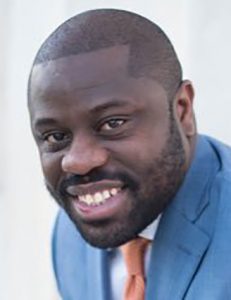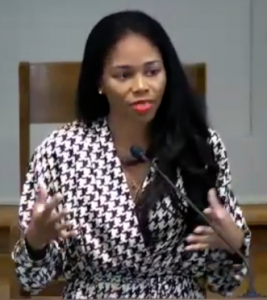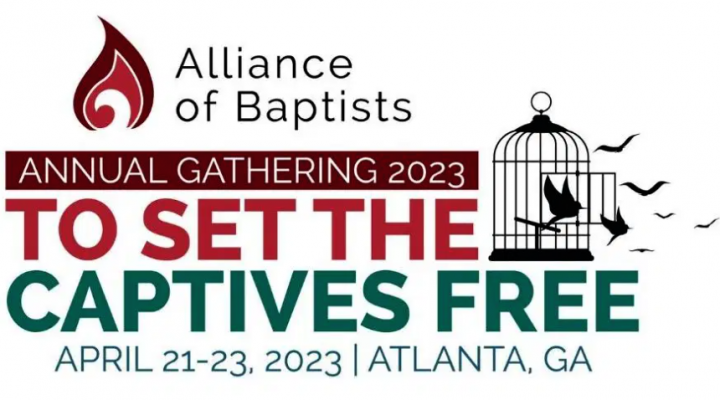A call to “Set the Captives Free” through policing reform and criminal justice reform permeated the annual gathering of the Alliance of Baptists held in April in Atlanta.
Several speakers explained the modern-day abolition movement, including Alliance Co-Director Elijah Zehyoue.
Today’s abolition movement is based on awareness “that the criminal justice system — or criminal legal system rather — that we have today is a result of the system of enslavement that so many people struggled against years ago,” he said. “That system of enslavement has not yet been abolished.”

Elijah Zehyoue
He explained: “All over the world, abolitionists argue that there’s a direct line from enslavement … to our current system of mass incarceration, our current system of police violence, of police brutality, of white supremacy.”
This particularly is evident in the United States in the period between the end of the Civil War and 1877, when federal troops were removed from the South, thus ending a time of relative economic, political and social freedom for newly freed former slaves, Zehyoue said.
“They were gradually pushed back toward slavery again. The period between 1877 and 1960 is the era of American lynchings. There were thousands of recorded lynchings.”
That’s also when American law enforcement evolved into a weapon, he said. “Our expanded policing tactics were used to discredit and delegitimize Civil Rights leaders from Martin Luther King to Malcolm X to Ella Baker. The FBI had files on all of them to prove that they weren’t really good people, after all, because they were trying to abolish a slavery that had evolved and metastasized over time.”

Derecka Purnell
That theme was echoed by keynote speaker Derecka Purnell, a human rights attorney and author of the 2021 book Becoming Abolitionists: Police, Protests, and the Pursuit of Freedom.
“I am an abolitionist because I want to pray for more interesting things, more beautiful things, more mundane things” than praying for protection from police brutality and about unjust incarceration for people of color,” she said. “I want my children to pray about new video games that are coming out, or for the Memphis Grizzlies to beat the Lakers, to make me a better person, a more curious person. Those are the desires that I have for my children.”
Setting captives free today will involve emulating the American slaves and their supporters who yearned for freedom, Purnell said.
“The people who prayed for the end of slavery, they didn’t simply wait for God. What did they start doing? They started running. They started rebelling. They started rising up. The people who chose not to run literally braided patterns in people’s hair so they could find the freedom route to Canada. They prepared food for each other. They prayed. They sang. They established an underground railroad. They hid people in their homes. They hid weapons in their homes just in case they needed to defend themselves against people trying to a attack them. We talk about Harriet Tubman. Harriet Tubman not only went back several times, she created the conditions for children to flee the plantation.”

Paige White
Washington, D.C., attorney and former public defender Paige White said she is convinced abolition of modern-day policing and prison is the only viable solution to pervasive systemic violence. She came to this conclusion, she said, after working within the criminal justice system for several years.
“There is just no other option. As many of you know, the police started off as slave catchers and I would submit to you that they are employing the same behaviors that they did back then.”
Too often, people of color are not viewed as human beings in that system, she said, citing as an example the case of Jayland Walker, a 25-year-old Black man shot multiple times by police in Akron, Ohio, after a car chase.
“Police can literally hunt people because that’s what they did to Jayland,” White said. “They hunted him. They unleashed horrific and unspeakable violence upon his body and upon that community and that family. And not only are there no consequences for that action, the police are now continuing to employ violence on people who are protesting.
“So, we have to ask ourselves: what are we doing? For me, abolition is the only choice because our current system doesn’t treat humans as humans,” she concluded.

Alexis Tardy
Womanist activist and minister Alexis Tardy testified that her involvement in the abolition movement is inspired by Jesus and Scripture.
“Life is precious, and my womanism talks about wholeness and healing and community. So, if these systems, institutions, the police, are about violence work and about death-dealing institutions, then I am against that because life is precious. When police and prisons are doing violence work, I think as Christ followers, that is something that we are all called to be against.”


